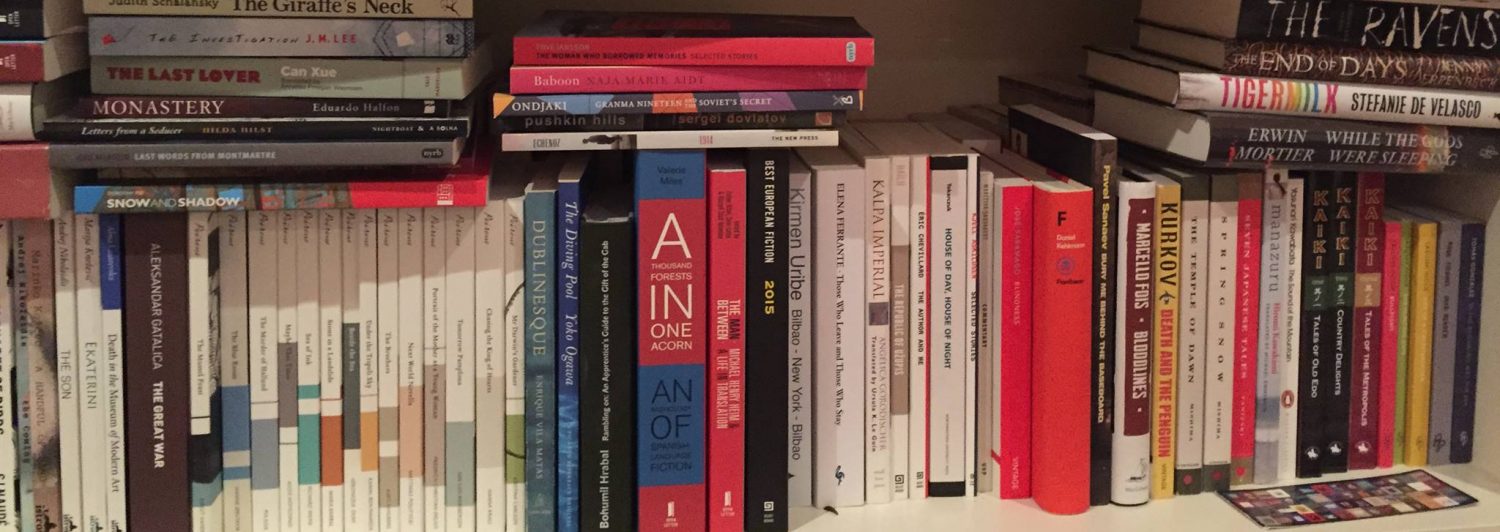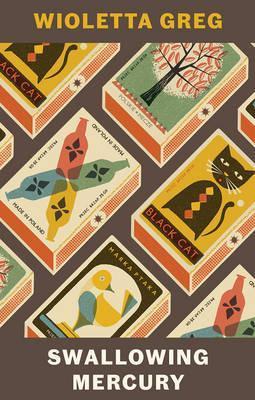
Before the Man Booker International Prize became an award for a single book, there was the Independent Foreign Fiction Prize, and I have been a member of that Shadow Jury since 2014, the year for firsts, when the Shadow Jury announced Jón Kalman Stefánsson’s “The Sorrow of Angels” as their “winner” of the award, a book that had not made the official shortlist!!
My review of that book can be found here in part reading:
“The Sorrow of Angels” is Jon Kalman Stefansson’s second work in a trilogy, following on from “Heaven and Hell” and is a simple tale of “the boy” following Jens the postman on a journey to deliver the mail, they are “on their way to a place that constantly seems to be retreating.” Jens “flourishes nowhere but far from human habitation; far from life, in fact”, a man who broods and prefers silence. “The boy” lives in the world of words, poetry and the power of speech, “a person who holds a pen and paper has the possibility to change the world”.
‘The Sorrow of Angels’ is simply angels tears which manifest as snow, snow storms, blizzards, purity, treacherous ravines, glaciers, iced tracks, cold, raging icy seas and more, and besides the boy and the postman the other main character here is the snow…the sorrow of the angels. This is a beautiful book, as delicate as a snowflake but also as treacherous, it contains the mysteries of humankind. Up numerous mountains, their journey is an arduous one. Am I right in assuming this is an Icelandic “Purgatorio” (Dante’s second work in “The Divine Comedy”)? Our two characters are travelling through the seven levels of suffering and spiritual growth? The work does have the purgatory feel, where our characters are neither in hell nor heaven, the chorus is the dead, they are led by ghosts but to their safety?
At 300 pages plus a journey of two characters up mountains and through constant snow storms, on the surface seems like an arduous journey for the reader. There are fleeting visits to outposts, where people have shackled down for the winter, and the breaks in their journey to defrost and drink coffee (and occasionally talk of poetry, for the boy that is) are the parts where their deeper human qualities are slowly peeled back. But as soon as you’ve settled into a small, warm shack in the wilds of Iceland you’re picked up and hauled out into the raging snowstorms once again, as Jens continues his long journey to deliver the mail.
Given my enjoyment of Jón Kalman Stefánsson’s earlier work I was very much looking forward to his latest book to be translated into English, “Fish Have No Feet”. Could it take out the 2017 Man Booker International Prize, giving recognition to the Icelandic writer?
The novel opens with a prelude, with ruminations on death, immediately you know that this is going to be a profound work.
Set in the fishing town of Keflavik, it cuts across three generations, moving from a bustling village reliant on fishing to the present day where the fishing quota has been removed from the town and therefore the people now live on the “quota-less sea”.
There’s the sea, so it’s that big?, before drawing the curtains, for who wants to have something that vast reminding them of better days, days of activity, when it was easy to walk tall, reminding them of having consented in silence to the sea’s fish stocks being converted into the bank accounts of fishing moguls and their descendants, to the gaping cod, the gleaming herring, becoming their blood, to the sea being privatised – we draw the curtains quick as a flash because it’s tough to have a sea teeming with fish right there before our eyes but to be prevented from fishing, to have a fish-processing company but nothing to process. (p22)
The main present day characters are Ari, who has for inexplicable reasons left his wife of twenty years and his children, and an unknown narrator, are they nephews? “A book of poems written by an unruly aunt of mine and Ari’s” (p68), or are they not related at all, Ari is “shy around his cousins, who are sitting on the bed and two chairs; he hardly knows them” (p158)? For me this mystical narrator (is he/she a ghost, an angel, a relation?) was very distracting. For scenes to be detailed about Ari in certain circumstances, for example, when he is alone in a hotel room, the impossible, strange, unreal feeling felt awkward. Although the narrator does detail Ari’s character though numerous means, analysing his contacts in his mobile phone…
Absurd? Dubious? Yes, and probably totally unhealthy to have your phone full of dead people’s numbers, numbers that only the past can answer, suggesting that a person who does so has unsolved psychological issues, refuses to face up to reality, doesn’t dare to, is an out-and-out escapee from life, a denier of the laws of nature; such things never end well. (p68)
A novel that attempts to address the “metaphysical”, what is life, death, lover etc. a book that contains a lot of questions, but do they make a satisfying meal? Examples of the plethora of rhetoric and existentialist questions;
Where does guilt come from? (p91)
Regret is the heaviest stone (p86)
Why have I lived? (p107)
Life is one chance, we get one chance to be happy, how can we make the most of it? (p222)
Some of the ruminations on life’s dissatisfaction are long winded and repetitive, I can almost see Jón Kalman Stefánsson sitting at his keyboard, drunk with melancholy, spreading his own dissatisfactions onto the page and then melding it with fiction.
As readers of Jón Kalman Stefánsson’s other books will know, he is big on weather imagery, snow drifts, winds, storms, being buried in snow, the language and style match this obsession…”because the weather has done so much to shape life in Iceland for more than one thousand years.”
The references to Iceland are interesting with subjects such as US airbases, the economy and politics sprinkled throughout, but are these enough to hold a rambling existentialist question mark together?
Like Jón Kalman Stefánsson’s favoured snowdrifts, this book can be seen as deep, it is unrelenting, it is harsh, but as we know when a large snow drift melts it leaves but just a puddle….
One of my least favoured works on the longlist, I know I am a bit of a lone voice here, although it does have a powerful ending, the impact, for me, was significantly reduced by the late development of the narrative that leads there, the character being a mere sketch and the coincidental nature of the discovery all make this a flawed tale. Overall a very disappointing journey.
Can it win the Man Booker International Prize? Some readers will champion this work, personally I think it is scattered and flawed with an unconvincing narrator and way too many unresolved threads. It reads as an opening book of a larger work, however I can assure you I won’t be joining in any further journeys…I’d be shocked if it did win the award, but nothing surprises me when it comes to literary prizes.
 Later today the official judges of the Man Booker International Prize will announce their winner, and to steal a little of their thunder the Shadow Jury is a few hours ahead of the official jury in announcing our favoured book from the thirteen titles that made the longlist way back in March of this year. It is a blessing that we had a decent amount of time to work our way through all the nominated books as there were several weighty tomes in the list.
Later today the official judges of the Man Booker International Prize will announce their winner, and to steal a little of their thunder the Shadow Jury is a few hours ahead of the official jury in announcing our favoured book from the thirteen titles that made the longlist way back in March of this year. It is a blessing that we had a decent amount of time to work our way through all the nominated books as there were several weighty tomes in the list.






